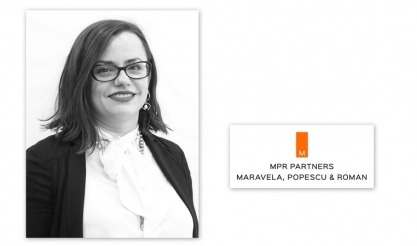
Should the controller reassess the relationship with its processor in the context of this new pandemic?
07 Aprilie 2020 Cristina Crețu, Senior Privacy & Technology Consultant - Maravela, Popescu & Roman
We live in a new era, where the risks are multiplying and endanger the security and integrity of data.

|
|
Cristina Cretu, Senior Privacy & Technology Consultant - Maravela, Popescu & Roman |
Pursuant to Regulation (EU) 2016/679 of the European Parliament and of the Council of 27 April 2016 on the protection of natural persons with regard to the processing of personal data and on the free movement of such data, and repealing Directive 95/46/EC (“General Data Protection Regulation”), controllers must only use processors that provide sufficient guarantees regarding their capability to implement appropriate technical and organizational measures to ensure that all processing activities are performed and protected in line with the legal requirements.
In this respect, before engaging the services of a processor, the controller must perform a proper assessment of the processor’s capabilities to process the entrusted personal data in a secure and confidential manner, in accordance with the provisions of the General Data Protection Regulation.
The duty of care that needs to be observed by the processor must be reflected into a contract concluded with the controller. Such contract must stipulate that the processor will take all technical and organizational measures to ensure a level of security in accordance with the risk, including inter alia as appropriate:
(i) the ability to ensure the ongoing confidentiality, integrity, availability and resilience of processing systems and services;
(ii) the ability to restore the availability and access to personal data in a timely manner in the event of a physical or technical incident;
(iii) a process for regularly testing, assessing and evaluating the effectiveness of technical and organizational measures for ensuring the security of the processing.
2. Times are changing, should the processors be reassessed?
Due to the new severe acute respiratory syndrome coronavirus 2, known as SARS-CoV-2, emergency measures were taken throughout the world in order to contain the spread of and fight against the effects of SARS-CoV-2. One of those measures was for the companies, where possible, to send their employees to work from home.
Does this new scenario change the controller’s initial assessment on the processor’s ability to ensure the technical and organizational measures in relation with the processing of personal data?
The answer is yes, if the controller considered only the capabilities offered by the processor within its premises. It is possible that most controllers did not took into account the processor’s readiness to ensure the secure processing of personal data via remote access by employees working from home. From a security perspective, any remote access to data might present a risk that needs to be properly addressed.
The EU Agency for Cybersecurity (“ENISA”), the National Cyber Security and Incident Response Teams (“CERTs”) and the national Data Protection Authorities (“DPAs”) are all advising on the need to maintain an adequate level of cybersecurity when working from home and recommend companies to take measures such as:
(i) to ensure that the corporate VPN solution scales and is able to sustain a large number of simultaneous connections;
(ii) to provide secure video conferencing for corporate clients;
(iii) all the corporate business applications must be accessible only via encrypted communication channels;
(iv) access to application portals should be safeguarded using multifactor authentication mechanisms.
These recommendations were issued not just because there is an increase in the number of people that are working and having access to systems remotely, but also because in this state of emergency the number of cyber-attacks, such as denial-of-service (DoS) and distributed denial-of-service (DDoS) attacks, man-in-the-middle (MitM) attack, phishing and spear phishing attacks, drive-by attack, password attack, intensified. Both situations can result in an increase number of security incidents, from which a lot of such might prove be data breaches.
In this context, it is evident that, from a security perspective, we operate in a scenario, that is different than the one took into account by the controller when selecting the processor. The initial assessment of the risks presented by the data processing, such as accidental and unlawful destruction, loss, unauthorized disclosure of data, translated into security measures meant to mitigate the respective risks. But now the scenario is different, and the risks presented by the data processing in the new environment (working from home) might require different security measures in order to mitigate the such.
In this respect, the controllers should perform at least an assessment on the security measures in place and if such measures are enough to ensure that their processors are still fit to handle the entrusted personal data.
3. Conclusion
| Publicitate pe BizLawyer? |
  |
| Articol 4053 / 4349 | Următorul articol |
| Publicitate pe BizLawyer? |
 |

RTPR a asistat PragmaGO la intrarea pe piața din România prin achiziția Omnicredit. Echipa a fost coordonată de Alina Stăvaru (Partner) și Ianita Țui (Counsel)
Andreea Zvâc face un pas înainte în carieră și devine Partener în cadrul biroului Wolf Theiss din București | Bryan W. Jardine (Managing Partner): Promovarea sa reflectă nu numai contribuțiile profesionale remarcabile la dezvoltarea departamentului său, ci și rolul semnificativ în consolidarea poziției generale a firmei pe piața din România
Bondoc & Asociații a asistat TDI Renewables, unul dintre principalii actori în domeniul dezvoltării regenerabile, într-o restructurare internațională
Cine sunt și cum gândesc profesioniștii evidențiați de Legal 500 în GC Powerlist Romania | De vorbă cu Mihaela Scărlătescu, Head of legal - Farmexim: „Când ești managerul unei echipe de legal, rolul nu se rezumă doar în a asigura îndeplinirea sarcinilor, ci este de fapt mai mult orientat spre partea umană. Cresc echipe, cresc oameni de niște ani buni și nu există satisfacție mai mare ca atunci când vezi transformarea acestora, acolo unde există ‘sămânța dorinței de a evolua ’ ”
VIDEO | Dicționar de arbitraj: Avansul cheltuielilor arbitrale (Powered by ZRVP)
„The Lawyer European Awards 2024”| Patru firme cu activitate în România concurează pentru titlu la secțiunea ”Law Firm of the Year: South Eastern Europe” | Popescu & Asociații și TZA, pe lista scurtă a premianților. ZRVP, pentru a treia oară în ultimii cinci ani, printre finaliștii secțiunii ”European litigation team of the year”
Rising Stars | Tudor Bonifate, primul admis la Facultatea de Drept și mai apoi șef de promoție în 2022, cu media 10, a ales să profeseze ca avocat la Țuca Zbârcea & Asociații: ”Învăț permanent – de la avocații care mă coordonează, de la colegii mei avocați, de la profesorii cu care am șansa de a colabora la facultate, de la studenții mei. Cred că avocatura mă face un profesor mai bun, după cum profesoratul mă face un avocat mai bun”
Încă un spin-off în piața avocaturii | Luminița Popa și Miruna Suciu, fondatoarele Suciu Popa, o iau pe drumuri diferite. Popa Legal se va focusa pe practica de arbitraj, iar Suciu Partners anunță consolidarea echipei
Țuca Zbârcea & Asociații apără interesele statului român în litigiul inițiat de Damen Holding la Curtea de Arbitraj de la Viena | Legea 187 ̸ 2023 referitoare la guvernanța corporativă a întreprinderilor publice a pus pe butuci modelul de cooperare cu investitorul olandez la Damen Shipyards Mangalia SA, o companie în care statul deține 51%, prin Șantierul Naval 2 Mai SA. Pierderea litigiului antrenează plata unor ”despăgubiri semnificative”
Mușat & Asociații intră în arbitrajul ICSID inițiat de bulgarii de la Eurohold și va lupta, de partea statului român, cu Pinsent Masons și DGKV. Reclamanții și-au ales un arbitru din Anglia
LegiTeam | Mitel & Asociații recrutează avocați stagiari
LegiTeam | Mitel & Asociatii caută avocat cu experiență (Litigii și Soluționare a Disputelor)
-
BizBanker
-
BizLeader
- in curand...
-
SeeNews
in curand...











 RSS
RSS














































